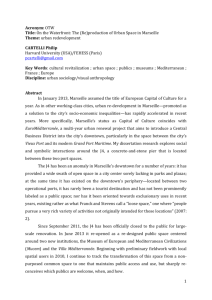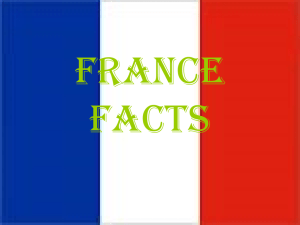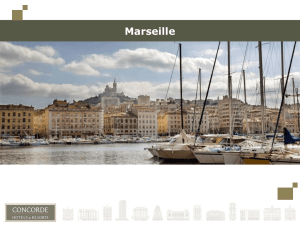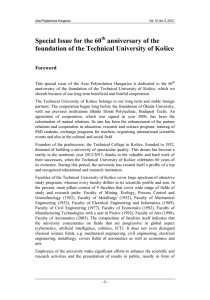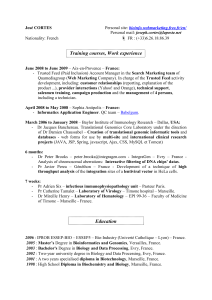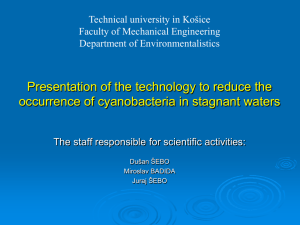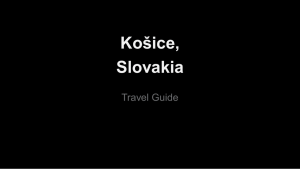IS YOUR HOMETOWN A CAPITAL OF CULTURE?
advertisement
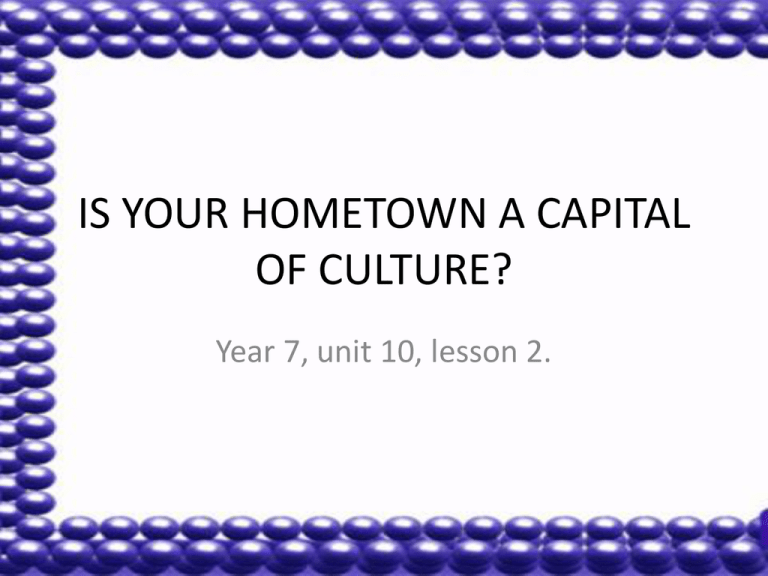
IS YOUR HOMETOWN A CAPITAL OF CULTURE? Year 7, unit 10, lesson 2. Grammar for revision -ing vs -ed • Сравните значение прилагательных, оканчивающихся на –ing и -ed , и вы увидите, что первое часто употребляется, когда описывают предметы, вещи, занятия, людей, которые вызывали те или иные чувства у людей; а второе – когда описывают состояние , вызванное этими предметами, вещами, чувствами и т.п.: • …an interesting book – interested in science, • …opening hours – an opened door, • …amazing view – amazed person Past Simple Passive • Was • Were VERB IN THE 3D FORM • СМ. предыдущие уроки. Grammar for revision -ing vs -ed • Сравните значение причастий I и II, и вы увидите, что первое часто имеет активное значение, а второе - пассивное: • using использующий - used использованный • taking берущий - taken взятый • building строящий - built построенный • studying изучающий - studied изученный S.B., pp. 184-185, ex. 1, part 1). 1. • • • • • • exciting; were; was founded; interesting; relaxing; interested; 2. • • • • • • • • • • • exciting; to visit; are; concerned; happen; to be; are involved; are decorated; is recognized; be built; be restored. • The European Capital of Culture is a city designated by the European Union for a period of one calendar year during which it organises a series of cultural events with a strong European dimension. • Preparing a European Capital of Culture can be an opportunity for the city to generate considerable cultural, social and economic benefits and it can help foster urban regeneration, change the city's image and raise its visibility and profile on an international scale. • An international panel of cultural experts is in charge of assessing the proposals of cities for the title according to criteria specified by the European Union. • A 2004 study conducted for the European Commission demonstrated that the choice of European Capital of Culture served as a catalyst for the cultural development and the transformation of the city. Consequently, the beneficial socio-economic development and impact for the chosen city are now also considered in determining the chosen cities • In 1985, former actress Melina Mercouri, then Greece’s Minister of Culture, and her French counterpart Jack Lang came up with the idea of designating an annual Capital of Culture to bring Europeans closer together by highlighting the richness and diversity of European cultures and raising awareness of their common history and values. • The Commission of the European Union manages the title and each year the Council of Ministers of the European Union formally designates European Capitals of Culture: more than 40 cities have been designated so far. • The European Capital of Culture programme was initially called the European City of Culture and was conceived in 1983, by Melina Mercouri, then serving as Greek Minister ofCulture. Mercouri believed that at the time, culture was not given the same attention as politics and economics and a project for promoting European cultures within the member states should be pursued. The European City of Culture programme was launched in the summer of 1985 with Athens being the first title-holder. During the German Presidency of 1999, the European City of Culture programme was renamed the European Capital of Culture. (put in as Reference: Kiran Klaus Patel, ed., The Cultural Politics of Europe: European Capitals of Culture and European Union since the 1980s (London: Routledge, 2013). European Capital of Culture • • • • • • • • • • • • • • • • 1985: Athens 1986: Florence 1987: Amsterdam 1988: Berlin 1989: Paris 1990: Glasgow 1991: Dublin 1992: Madrid 1993: Antwerp 1994: Lisbon 1995: Luxembourg 1996: Copenhagen 1997: Thessaloniki 1998: Stockholm 1999: Weimar 2000: Avignon, Bergen, Bologna, Brussels, Helsinki, Kraków, Prague, Reykjavík, Santiago de Compostela European Capital of Culture • • • • • • • • • • • • • 2001: Rotterdam, Porto 2002: Bruges, Salamanca 2003: Graz 2004: Genoa, Lille 2005: Cork 2006: Patras 2007: Sibiu, Luxembourg, Greater Region 2008: Liverpool, Stavanger 2009: Vilnius Linz 2010: Essen (representing the Ruhr), Istanbul, Pécs 2011: Turku, Tallinn 2012: Guimarães, Maribor * According to the official EU website. The cities and countries from 2020– 2029 are not yet finalised. European Capital of Culture • Present year • 2013 – Marseille (Marseille 2013) – Košice (Košice 2013) • • • • • • • • Marseille Košice Future years 2014: Umeå, Riga 2015: Mons, Plzeň 2016: San Sebastián, Wrocław 2017: Aarhus, Paphos 2018: Malta, Netherlands 2019: Italy, Bulgaria The Commission proposes countries to host European Capitals of Culture after 2019 • 2020: Croatia, Ireland and candidate or potential candidate country Year 2013 European Capital of Culture Marseille (Marseille 2013) Košice (Košice 2013) • Marseille -City of CultureThis is the guide in English for all things about Marseille. • http://marseillecityofcul http://www.kosice2013.sk/e ture.eu/capital-ofn/ culture.html European Capitals of Culture : the road to success https://www.youtube.com/watch?v=04bgYw4OJMQ&playnext=1&list=PL5CVVpkRif_YPRF3Ku QdotmMFThRuuvnN&feature=results_main Resources • http://en.wikipedia.org/wiki/European_Capital_of_Cul ture • http://en.wikipedia.org/wiki/File:Cathedral_of_St._Eliz abeth_in_Ko%C5%A1ice.jpg • http://en.wikipedia.org/wiki/File:MarseillePaysage.jpg • http://en.wikipedia.org/wiki/File:Ko%C5%A1ice_Hlavn %C3%A1.jpg • http://marseillecityofculture.eu/capital-of-culture.html • https://www.youtube.com/watch?v=04bgYw4OJMQ&p laynext=1&list=PL5CVVpkRif_YPRF3KuQdotmMFThRuu vnN&feature=results_main

